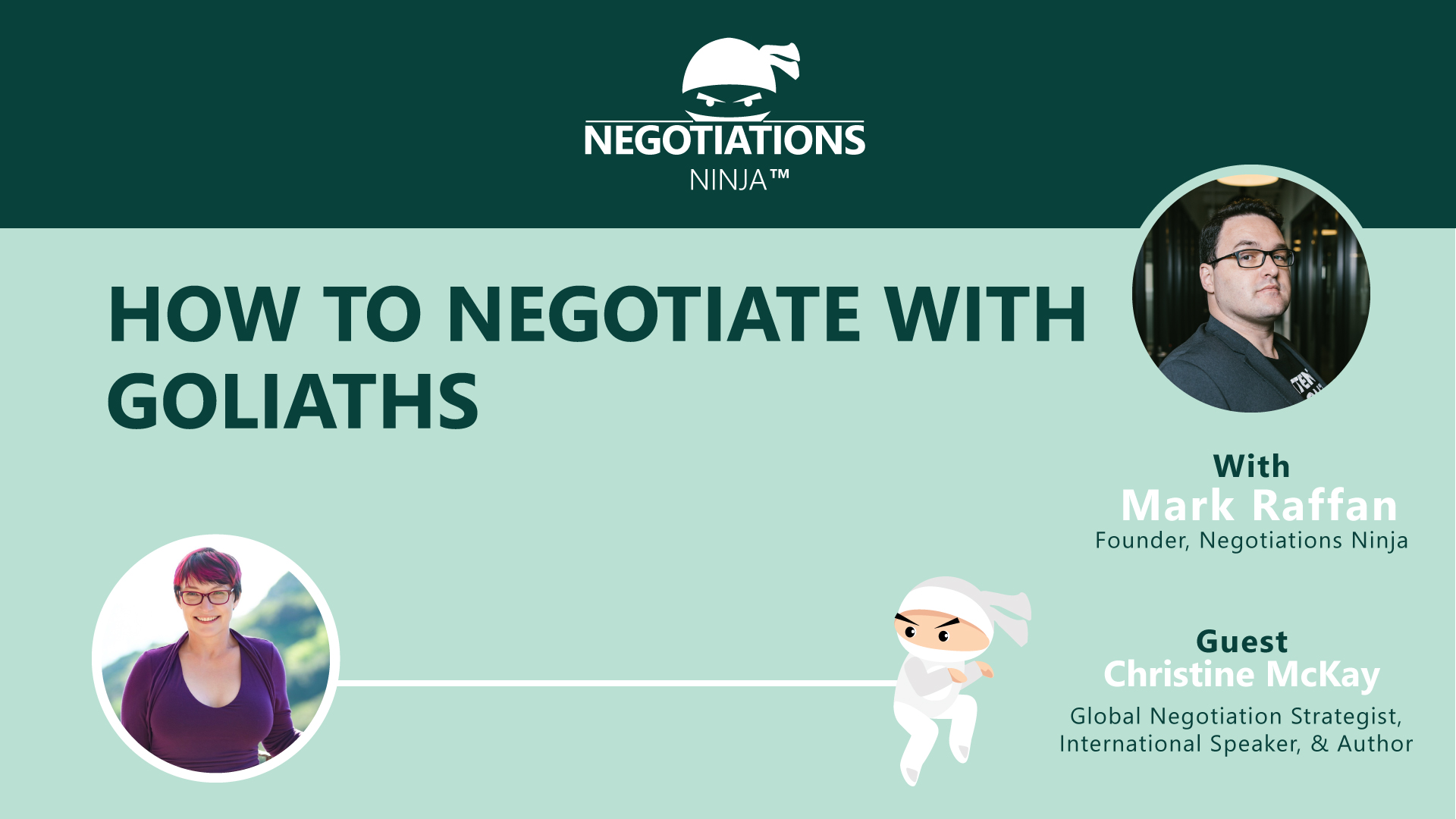You’re a small organization about to enter a negotiation with a large company. You’re prepared to go in and sign the contract because simply doing business with them could be astronomical for your company. But just because you’re a small company doesn’t mean you can’t negotiate with Goliaths. In this episode of Negotiations Ninja, Christine McKay shares how you can strategically use contracts to negotiate better terms, even as a small fry. Don’t miss it.
Outline of This Episode
- [1:32] Learn more about Christine McKay
- [1:59] How small organizations can negotiate with goliaths
- [4:22] What are the implications of saying “yes?”
- [8:03] How can you become more aware of emotions?
- [13:22] Leverage is something you volunteer to give up
- [18:15] Renegotiation is always an option
- [20:08] Christine’s contract risk review process
How small organizations can negotiate with goliaths
Christine points out that even though big organizations slide a contract your way and tell you to sign it, it’s still negotiable (far more than you’re led to believe). Many small companies see topline revenue and focus there and don’t realize how complicated it is to service larger organizations. Are you prepared for that?
Are you being had? If you are, do you care? If you care, what are you going to do about it? That’s where Christine comes in to help you figure out how to maximize the relationship from a profitability perspective. If the big company is strangling you on profitability and your costs go up, is that worth it?
What are the implications of saying “yes?”
“Yes” can come with a lot of strings. What happens after you say yes? Where do you start?
Most large companies publish at least some version of a contract. If a company is doing business with the US Government, its standard terms and conditions have to be public. So if Christine is negotiating with Boeing, she can download and peruse some of their standard contracts.
Smaller sales organizations are so focused on what they think they want that they don’t take time to try and understand what their counterparty will present them with. They have to be prepared to address those things. So what does Christine look for in their contracts?
She looks at consistent language across their contracts. If she sees consistent language, it might be an internal policy that crosses the whole organization and will likely be harder to negotiate. It’s the inconsistencies that lead to an opportunity to negotiate.
Contracts are a strategic document. You can use information from the past to divine a future, but an agreement must happen in the present. That gives her the ability to create a roadmap for the future. She can estimate the economic impact of the contract on her price before having that conversation with that account.
Renegotiation is always an option
Many people agree to something in the moment that they think they can do, but in actuality, they can’t deliver. Or, an external factor changed the situation. How do you approach those situations?
If you weren’t transparent on the front end, it becomes much harder to give yourself permission to bring up difficult conversations down the road. You can renegotiate contracts—so why not ask? If things change, why not revisit the terms?
The key is using language your counterpart understands. They may not see how whatever is affecting you will negatively impact them. Setting the conversation up from that perspective matters in a renegotiation.
Christine’s contract risk review process
People struggle because they don’t have someone going through the contract review process with them. That’s why it became a service that Christine offers. She’ll look at contracts and present her clients with an overview of where they’re facing risk.
She’s found that smaller and mid-size organizations don’t understand where risks are in their agreements and how it’s costing them. Large companies might reference HR procedures, operating manuals, and anything from invoicing to labeling. That’s fine if you can adhere to it. If you don’t, you won’t get paid.
So Christine presents the contractual risks and then offers suggestions they can use to counter those risks. It’s a hugely successful offering in the market.
Christine covers more about managing your emotions in contract negotiations in this episode. Give it a listen!
Resources & People Mentioned
- Why Not Ask?: A Conversation About Getting More
- The Power of a Positive No: How to Say No and Still Get to Yes
Connect with Christine McKay
- Venn Negotiation
- Connect on LinkedIn
Connect With Mark
- Follow Negotiations Ninja on Twitter: @NegotiationPod
- Connect with Mark on LinkedIn
- Follow Negotiations Ninja on LinkedIn
- Connect on Instagram: @NegotiationPod




